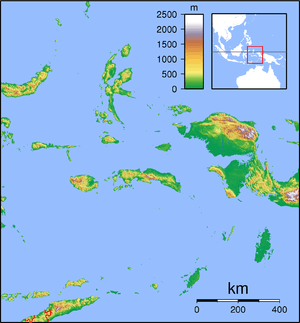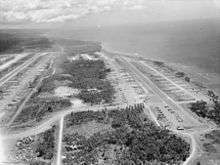Pitu Airport
| Leo Wattimena Airport Bandar Udara Leo Wattimena | |||||||||||||||
|---|---|---|---|---|---|---|---|---|---|---|---|---|---|---|---|
| IATA: OTI – ICAO: WAMR | |||||||||||||||
| Summary | |||||||||||||||
| Airport type | Public, Military | ||||||||||||||
| Operator | Government | ||||||||||||||
| Serves | Morotai | ||||||||||||||
| Location | Morotai Island, North Maluku, Indonesia | ||||||||||||||
| Elevation AMSL | 49 ft / 15 m | ||||||||||||||
| Coordinates | 02°02′45.76″N 128°19′29.28″E / 2.0460444°N 128.3248000°E | ||||||||||||||
| Map | |||||||||||||||
 OTI Location of airport in Maluku | |||||||||||||||
| Runways | |||||||||||||||
| |||||||||||||||
Leo Wattimena Airport, formerly known as Pitu Airport (IATA: OTI, ICAO: WAMR) is a private airport located on the southern coast of Morotai Island, North Maluku, Indonesia.
History

Moratai island was the final island invasion in Netherlands New Guinea before the liberation of the Philippines. The island was recaptured by the 31st Infantry Division on 15 September 1944, meeting only light opposition. General MacArthur and Rear Admiral Barbey landed on the day of the invasion to make an inspection. At the time, the island had only five hundred Japanese defenders.
After the landings, the Allies constructed two airfields on the island, Wama and Pitu. Wama was constructed almost along the shoreline and was used as a fighter airfield. It was abandoned after the war. Pitu was built as a bomber airfield to the north inland, and is currently used as a commercial airport.
After the war, the island was one of the largest Fifth Air Force aircraft reclamation center in the Pacific. A smelting operation was established, and USAAF planes from all over the region were flown there to be scrapped. Despite scrapping the island was crammed full of aircraft and vehicles until 1988 when it was cleared in a final scrap drive. The scrap was taken to Krakatau Steel Mill in Java.
Allied units stationed on Moratai
- 38th Bombardment Group (15 October 1944 – 29 January 1945)
- 310th Bombardment Wing (18 September-14 November 1944)
- 8th Fighter Group (19 September – 20 December 1944)
- 35th Fighter Group (27 September 1944 – 20 January 1945)
- 418th Night Fighter Squadron (28 September-26 December 1944)
Airlines and destinations
| Airlines | Destinations |
|---|---|
| Wings Air | Manado, Ternate[1] |
| Dimonim Air | Ternate |
See also
References
![]() This article incorporates public domain material from the Air Force Historical Research Agency website http://www.afhra.af.mil/.
This article incorporates public domain material from the Air Force Historical Research Agency website http://www.afhra.af.mil/.
- Maurer, Maurer (1983). Air Force Combat Units Of World War II. Maxwell AFB, Alabama: Office of Air Force History. ISBN 0-89201-092-4.
- www.pacificwrecks.com
.svg.png)